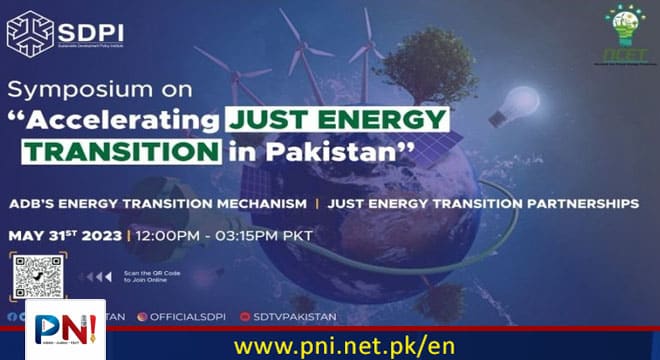ISLAMABAD, Jun 3 (APP): Just energy transition partnerships (JETP) are vital to phaseout coal and mobilize investments towards renewable energy transition in Pakistan.
This was the crux of a symposium on “Just energy transition in Pakistan” jointly organized by Sustainable Development Policy Institute (SDPI) and Network for Clean Energy Transition in Pakistan: Research and Advocacy here on Saturday.
SDPI Joint Executive Director Dr Vaqar Ahmed highlighted that the current challenges slugging rapid offtake of renewable energy in Pakistan arise from inadequacy of infrastructure and grid stability. He stressed innovative decentralized energy models, micro-grids, encouraging development of local RE industry and building storage capacity to address these challenges.
Michael Waldron, Economic Affairs Officer, United Nations Economic and Social Commission for Asia and the Pacific (UNESCAP) emphasized the need to increase energy sector investments by 3-4 folds to meet SDGs.
He highlighted that JETP can play key role by providing low-cost finance to renewable energy, promote investment-grade domestic policies to phaseout fossil fuels, and support just transition for affected workers. He further stressed prioritizing halting coal power development and retirement of existing plants and considering solutions for repurposing of coal power plants and incentivize RE solutions.
Dr Khalid Waleed, Lead Researcher, SDPI highlighted that Asian Development Bank’s Energy Transition Mechanism (ETM) can provide technical assistance, policy support, capacity building, and financing mechanisms. He highlighted various factors which must be considered for effective implementation of the ETM.
These include analyzing the long-term sustainability and accumulation of debt, conducting comprehensive research and data collection, establishing monitoring and evaluation frameworks, promoting knowledge sharing and learning from other countries experiences, adapting the approach to the local context, building capacity, raising public awareness, and engaging stakeholders.
Fiza Qureshi, Manager Program, Indus Consortium, expressed that ADB’s ETM lacks a direct communication line for all stakeholders to air their concerns. Stakeholder mapping does not consider the broader communities that are impacted
by these powerplants and there is no indication of carrying out an assessment for compensating broader communities
and areas that are adversely impacted due to polluting assets. Data disclosures, transparency and openness in the
ETM process are essential to take all stakeholders’ concerns on board.
Syaharani, Researcher, Indonesian Center for Environmental Law (ICEL) urged for data disclosure by ADB and other stakeholders in implementation of JETP for effective monitoring of the process. A supporting policy and framework is needed to manage the workforce transition as there is still a huge gap when it comes to the socio-economic aspects
of the transition.
Asad Mahmood, renewable energy expert mentioned that revisiting ambitious NDC targets can demonstrate Pakistan’s readiness for climate action when UNFCCC’s “Enhanced Transparency Framework” comes into action and states have
to report NDC tracking activities and the tools (ETM and JETPs).
Matthew Gray, CEO, Transition Zero mentioned that effective implementation of Just Energy Transition Partnerships requires energy planning tools, which typically come from large electricity systems models to inform long-term power development plans. Most of the tools and plans for developing and emerging economies are inaccessible. He also mentioned that Transition Zero is working to reduce the barriers where policy and decision makers can make and
run their own scenarios without having in-depth knowledge of modeling tools.
Afia Malik, Senior Research Economist, PIDE mentioned that Pakistan’s existing coal capacity will slow down transition to renewable energy as coal projects under CPEC have long term agreements of 30 years or so with sovereign guarantees. She further said that logistic issues exacerbated by Russia-Ukraine conflict and Covid-19 have inflated global gas prices. Coupled with depleting gas reserves Pakistan’s reliance on coal for generating power has increased.
Follow the PNI Facebook page for the latest news and updates.









